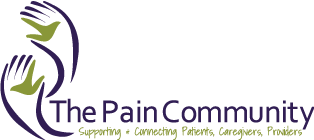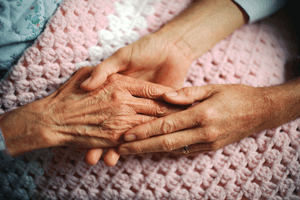-
Teresa Shaffer posted a new activity comment 10 years, 3 months ago
Thank you ladies. It is my hope that this will help people living with pain to stop being afraid of speaking up.
It is our time be heard and heard we must be! -
Teresa Shaffer wrote a new post 10 years, 3 months ago
 I recently wrote a blog titled, Enough is Enough! Stop the Stigma Against People Living with Pain. This is the second entry sharing the frustration that I, along with other people living with pain, face every day. […]
I recently wrote a blog titled, Enough is Enough! Stop the Stigma Against People Living with Pain. This is the second entry sharing the frustration that I, along with other people living with pain, face every day. […] -
Teresa Shaffer posted a new activity comment 10 years, 3 months ago
Thank you, Petmom1 & Janice R. It continues to boggle my mind how some people who have given themselves the titles of ‘experts” get the media and other people to actually believe everything they say.
-
Teresa Shaffer wrote a new post 10 years, 3 months ago
 It seems like just about every media article talking about pain medications has become a feeding frenzy which reports one side of the story. They take advantage of the uninformed and promote fear with biased and unsubstantiated claims that everyone who is prescribed an opioid medication has or will become addicted to the medications. They feed into the fear that if you have a loved one or friend who is prescribed one of these medications then you had better watch them closely because once addicted they will steal, cheat and lie to get their “fix.” This, my friend, is propaganda [information which is biased or misleading nature and used to promote or publicize a particular political cause or point of view].
It seems like just about every media article talking about pain medications has become a feeding frenzy which reports one side of the story. They take advantage of the uninformed and promote fear with biased and unsubstantiated claims that everyone who is prescribed an opioid medication has or will become addicted to the medications. They feed into the fear that if you have a loved one or friend who is prescribed one of these medications then you had better watch them closely because once addicted they will steal, cheat and lie to get their “fix.” This, my friend, is propaganda [information which is biased or misleading nature and used to promote or publicize a particular political cause or point of view].I am so sick of reading these articles. I am so angry at all those who continue to suggest, promote and endorse these types of stories to the media in an attempt to influence and sometimes brow beat government agencies and politicians to legislate tougher laws and regulations. They claim “their cause” is to address prescription drug abuse to prevent overdose and death, but their methods are short sighted. The so-called “un-intentional” consequence, to me, seems quite intentional. Why put the onus of substance abuse on people living with pain? We did not create this public health problem nor are most of us misusing, abusing or selling our pain medicine. We are too busy trying the best way we know how to live a worthwhile life with another public health problem—the undertreatment of pain! Why make it harder for the legitimate person with pain to obtain an effective medication needed to lessen their daily agony? Why scare our doctors out of wanting to help treat us? Don’t we have a right for some sense of normalcy in our lives?
You notice there is a lot of information missing from these articles. There is no mention of how pain medications allow some people living with pain to have functional lives. There is no mention of how pain medications allow some people living with pain to continue to work. There is no mention of how pain medications allow some people living with pain to have quality in their life. We want nothing more than to have our pain treated in a manner that allows us to live our lives just like people who have other chronic medical conditions, like heart disease, diabetes, cancer and so on. As with any chronic disease, it is not all about taking medications. As with other diseases, when you have chronic pain, it means a full treatment plan is required to help lessen the pain and regain function. People with pain often use exercise, physical therapy, water therapy, massage and so much more. It is NOT just a pill for every ill.
When someone reads one of these poorly researched and unbalanced articles, I can imagine that they start thinking about a family member or friend who lives with pain. Then, they may question whether that person has real or legitimate pain. I know readers must think that if you are taking an opioid pain medication for pain that you must be addicted to them. It’s no wonder; the definition of addiction as compared to physical dependence is often confused as one in the same and this is incorrect. This information is often touted and reinforced by so-called experts who know little about pain and its management and incorrectly equate pain treatment as all about the medications prescribed.
Please allow me to enlighten those of you who do not know the difference between tolerance, dependence, and addiction. These definitions have been recommended by respected medical societies, like the American Academy of Addiction Medicine (ASAM), the American Pain Society (APS) and the American Academy of Pain Medicine (AAPM).
[bullet_list icon=”check” indent=”20px”]
Tolerance – Tolerance refers to a situation where a medicine becomes less effective over time. (Your body adapts and gets use to it.)
Dependence – Dependence means that a person who has been taking a medication for a long period of time can develop symptoms of withdrawal if the medication is suddenly stopped, the dose is lowered too quickly or another medication is given that reverses the effects. (Your body adapts and gets use to it.) This effect can happen with many medications not just pain medications, like steroids, certain heart medications and anti-depressants.
Addiction – Addiction is a primary, chronic disease of brain reward, motivation, memory and related [nervous system] circuitry (ASAM). It is a condition where there is craving for this substance, the compulsive use despite harm, and impulse control loss of how they use the medication. The person does not care that they are harming themselves or others; they will do whatever it takes to obtain medications. They will engage in unacceptable and unsafe behaviors.[/bullet_list]
If you have a past history or current history of substance abuse the chance you will develop a problem taking opioid medications is higher than someone who does not have that history. Your level of risk should be considered before opioids are recommended. Yet, with open communication and close monitoring by your health care professional, even those at higher risk can take these pain medications more safely.
It is important to emphasize that no matter what your circumstance that these medications can be prescribed appropriately by knowledgeable clinicians and you take the medication safely if you do so as directed and report any problems immediately.
So how do we change this growing stigma against people living with pain? How do we fight back?
We get out there and enjoy our lives. We get out and do what we want to do, when we want to do it. We don’t let the fact that we use a cane, walker, crutches, wheelchair and other medical devices define us as part of the problem of drug abuse.
We stay informed and share our knowledge. When a friend or family member questions about addiction, we make sure we can give them facts and direct them to reliable resources. We must stop all the myths that are out there.
We must fight back with truth. Get angry and use that energy in a positive way. Take the time—NO, MAKE THE TIME and read what is published by the media. Comment back. Give them the facts and remind them of the harm they are contributing to by fueling distortions and misconceptions. Make them learn the other side of the story; offer to be interviewed, submit a letter to the editor, write a blog—take them to task.Together we can make a change for the better. We can help stop this feeding frenzy that is making our lives with pain much more difficult than it has to be. If we don’t, who will?
-
Amen, Sister!!! Get angry and get active!!! The silence is far too painful.
-
Agree with Theresa in a big way. Unfortunately we are now seeing a progression of all this to chronic pain isn’t that bad or just doesn’t exist. Several articles are attacking the 2011 IOM report on chronic pain. One of them was titled “Commentary: Exaggerating our pain” A quote from that article ““There are certainly 100 million people who experience back pain and arthritis,” he said. “These are common problems. Is there 100 million who have chronic pain that is as consequential as cancer? No. “You don’t want to over-medicalize something.” (who does he think he is, believing HE can say just how bad my pain is and whether it is worth treating?) The City of Chicago is suing pharmaceutical companies ““They knew—and had known for years—that opioids were too addictive and too debilitating for long-term use for chronic non-cancer pain,” (which we know is an out right lie-opioids work well for many types of pain (and there are studies to support that). Some insurance companies will only pay for 90 days of opioids; MaineCare won’t allow opioids with a few exceptions, Louisiana Medicaid will not treat Chronic pain at all. An organization called Maine collaboration seeks to “teach” doctors Opioids shouldn’t be used for non cancer pain (and doubtful with that) as well as teach “these people” (referring to people with chronic pain) we can’t make all their pain go away. I continue as the Portland Press herald prints mostly only the negative (they supported big time the Maine Collaborative, refusing to print my response) I agree with Theresa especially #3. It is important we put a face on Chronic Pain and not let them get away with “these people” remarks.
-
Thank you, Petmom1 & Janice R. It continues to boggle my mind how some people who have given themselves the titles of ‘experts” get the media and other people to actually believe everything they say.
-
-
Teresa Shaffer commented on the post, The Journey of Pain: Anger, Depression and Acceptance 10 years, 4 months ago
Hi Happy Girl,
I am doing well? I spend my time helping others on this journey of pain and that helps me stay positive and strong on my own journey. I hope that you are doing well. I am happy that you have […]
-
Teresa Shaffer replied to the topic Water therapy in the forum Treatment Options for Pain 10 years, 4 months ago
It is totally heartbreaking to start and just about the time you are seeing wonderful results you have to stop. I agree Dionetta, the insurance will cover those expensive injections but not continued use of a heated pool where a person gets the most benefit from.
-
Teresa Shaffer commented on the post, I Want To Play Outside, Too! 10 years, 4 months ago
Petmom1,
Good for you for getting your brother up and out the door. I am sure that you have shared with him that regular exercise like walking will help keep the joints flexible as well as helping to maintain a […]
-
Teresa Shaffer wrote a new post 10 years, 4 months ago
-
Teresa Shaffer wrote a new post 10 years, 4 months ago
-
Teresa Shaffer wrote a new post 10 years, 5 months ago
-
Teresa Shaffer commented on the post, Get Up Off the Couch! 10 years, 6 months ago
@Walker2005, thank you for sharing. I came to the conclusion many years ago that those in my family that are in denial, do care, they just are frustrated because they feel as if there is not anything they can do […]
-
Teresa Shaffer wrote a new post 10 years, 7 months ago
-
Teresa Shaffer and
 Jim Stemple are now friends 10 years, 7 months ago
Jim Stemple are now friends 10 years, 7 months ago -
Noki4 and
 Teresa Shaffer are now friends 10 years, 7 months ago
Teresa Shaffer are now friends 10 years, 7 months ago -
Micke Brown, BSN, RN and
 Teresa Shaffer are now friends 10 years, 7 months ago
Teresa Shaffer are now friends 10 years, 7 months ago -
Teresa Shaffer commented on the post, Get Up Off the Couch! 10 years, 8 months ago
Like you, I have advocated for those living a journey with pain for many years now.
It is a wonderful change of pace to hear the victory stories. I tell people all the time that the pain doesn’t have to change […]
-
Teresa Shaffer commented on the post, Get Up Off the Couch! 10 years, 8 months ago
Walker2005,
What a wonderful story, thank you for sharing.
It is my hope that others are able to find the wonderful adventures waiting for them that you and I have found.
By taking that first step of […] -
Teresa Shaffer wrote a new post 10 years, 8 months ago
-
Teresa Shaffer wrote a new post 10 years, 9 months ago
-
Teresa Shaffer wrote a new post 10 years, 10 months ago
- Load More








Bravo Teresa what an amazing blog. Thank you for being so honest and putting it out on the table.
Yes, I too am sick and tired of the endless media coverage that is biased, half truths and blatantly puts the blame of the drug abuse epidemic on the backs of those of us in pain.
There are 2 epidemics – drug abuse addiction and the undertreatment or might I be bold enough to say mistreatment of those in pain.
When someone drinks to excess – drives a car and kills innocent people or themselves do we hear an outcry in the media for the prohibition of alcohol? Never!!! But let one person obtain pain medications illegally via deception, robbery or other illegal avenue and overdose and / or die there is an immediate outcry in the media for the removal of all prescription pain medications,
The medications are demonized and with it the millions of persons who depend on these same medications to live a life without excruciating 24/7 pain.
We need better pain treatment AND we need better treatment for,drug abuseaddiction. 2 separate issues that require 2 separate solutions.
Thank you Teresa for challenging each and every one of us to speak out, shout and scream about the injustices done to people in pain. I see this from 2 points of view- that of a person in pain and that of a clinician who helps people in pain find solutions and treatment that addresses their unique pain issues. Pain is complex and the solutions are complex as well.
Kudos for your frankness, Teresa! This is one blog that all must share and encourage comments from the many who live with pain everyday. You are so right—Enough is enough and together we must scream, holler and shout. If not, we are to blame that pain care does not improve and this terrible state of affairs does not return to sanity and humane discourse.
Thank you ladies. It is my hope that this will help people living with pain to stop being afraid of speaking up.
It is our time be heard and heard we must be!